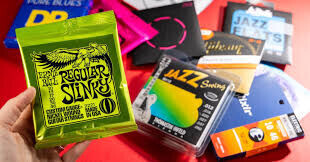
Guitar strings aren’t just strings; they play a huge role in shaping your sound. When it comes to materials, you’ve got options like nickel, stainless steel, and cobalt. Nickel strings tend to offer a warm, mellow tone, which suits a classic rock vibe. Stainless steel, on the other hand, brings out a brighter sound with a nice crisp edge, perfect for heavy-hitting metal. Cobalt strings? They bring some serious volume and clarity across the board. Each material gives its twist to your music, so pick what vibes with your style.
Guitar string gauges are all about thickness. Lighter strings are easy on the fingers and great for bending, making them a favorite for lead guitarists. Medium ones offer a good balance, keeping rhythm and lead players happy. If you’re looking for beefy tone and you’re a fan of deep, resonant sounds, heavy strings might be your jam.
Then there’s the choice between coated and uncoated strings. Coated strings might be pricier, but they tend to last longer and feel smoother. They’re also a lifesaver if your hands get sweaty while playing. On the flip side, uncoated strings could give you a more traditional feel and clearer tones, though they might not last as long.
Core shape and winding method are like the secret sauce in your string selection. Hex core strings offer bright tones and great tuning stability, a solid choice if you’re gigging frequently. Round core, in contrast, is known for its flexibility and vintage warmth, ideal if you’re chasing those easy blues lines. The winding method – roundwound and flatwound – also adds its flavor. Roundwound strings are fab for that gritty rock sound, while flatwound strings offer a smoother tone, often favored in jazz.
Factors to Consider When Choosing Guitar Strings
Your playing style and music genre can seriously steer your string choices. If you’re all about fingerstyle or soft strumming, lighter strings are probably your thing. For those who love head-banging riffs or some tough shredding, heavier gauges offer durability and depth.
Different guitars have unique setups, especially when it comes to the bridge type. Fixed bridges work well with most string types, but if you’re rocking a floating bridge, string tension becomes a priority to avoid mishaps during those killer solos.
Don’t ignore the lifespan of your strings. If durability is high on your list, opting for high-quality materials or coated strings can be a smart move. They hold up better with regular use, especially if your guitar is your all-day companion.
Balancing cost with quality is another consideration. While pricier strings may offer superior features like corrosion resistance or enhanced playability, budget-friendly options can still sound fantastic if chosen wisely.
It’s not just about the brand name or cool packaging; it’s about what sounds and feels right in your hands. Knowing what you’re looking for in terms of sound, feel, and longevity helps streamline your shopping, so you’re not stuck in an endless cycle of trial and error.

Top 10 Tips For Selecting Your Perfect Guitar Strings
- Finding the right guitar strings doesn’t happen overnight, so test out different sets to see what works best for your ear and playing style. Borrow a few ideas from fellow guitarists or hit up your local music pros for their insight.
- Checking out online reviews and research helps too. There’s plenty of wisdom out there from those who’ve walked this path, and you might catch some tipping points you haven’t considered.
- For beginners, sensitivity matters. You want strings that don’t make your fingers cry but still push you to explore new techniques.
- Your playing frequency can guide how often you need replacements. Heavy-duty play might mean quicker changes, but knowing when to swap keeps your sound fresh.
- Consider where you’ll be playing most. Humidity, temperature, and sweat levels can all affect string wear, so tailor your choices to your environment.
- There’s no ignoring brand reputation. Loyal followers of a string brand usually have good reason for their choice, so some homework here can point you in the right direction.
- In the digital age, apps and online platforms offer nifty tools to help you organize string maintenance or keep track of new finds you want to try.
- Keeping strings fresh is a game-changer. Regular changes not only sharpen your sound but can make reaching that perfect pitch a whole lot easier.
- Listen to your gut and let your ears lead the way in this hunt for the ideal strings. Being open to changes and understanding what your guitar ‘wants’ can transform your music.
- Your strings are the medium through which your guitar communicates. Identifying what works for you and your instrument simplifies this dialogue, leading to a beautiful harmony.
